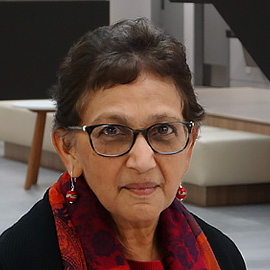Seeta Durvasula (MBBS, MPH, PhD) is a Senior Research Fellow with the Department of Developmental Disability Neuropsychiatry (3DN). She is working in the Australian Department of Health and Aged Care Intellectual Disability Health Curriculum Development Project, as well as other educational initiatives of 3DN.
Seeta is a medical practitioner with over 30 years of clinical experience in specialised, comprehensive health assessments for people with intellectual disability and complex health conditions. She has previously worked at the Centre for Disability Studies, University of Sydney as a Senior Lecturer, teaching undergraduate and postgraduate medical and allied health students in intellectual disability health. Seeta was also a Clinical Director for two specialised multidisciplinary health services for people with intellectual disabilities.
Seeta’s clinical, teaching and research interests include ageing, frailty, preventive health, health inequalities and health outcomes in people with intellectual disability.
